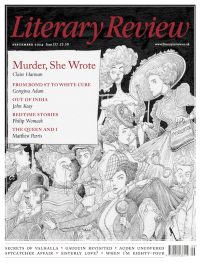Lucy Hughes-Hallett
The Crying Game
There’s a song I remember from my childhood that begins: ‘Boys cry/When no one can see them.’ It matched a heartbreak story with an incongruously jaunty tune. On YouTube you can see singer Eden Kane performing it in 1966, exchanging flirty grins with girls in the audience, as though to endorse its message. It marked the end of his pop stardom. The song peaked at number eight in the charts, and he never had another hit. But however disappointed he may have been, I bet Eden, who wore a leather jacket and looked rugged in a fake American way (he lived in Croydon), never let the fans see him cry.
Fashions in masculinity change, though. This summer numerous boys, and men, have been crying publicly. The Euros, Wimbledon, the Olympics – each has presented us with the spectacle of sportsmen weeping. Footballers on the losing side collapse to the ground when the final whistle is blown and cover their eyes as their shoulders heave. An Olympian stands on the podium (yes, he’s won a medal but only a silver one) barely able to hold on to the flag draped around his shoulders because his fingers are busy wiping tears from his cheeks. A superannuated tennis player leaves the court after his last match and everyone, from the even older stars in the audience to the dourest linesman, has a trembling lip. Far from waiting until they are alone and unobserved, heartbroken males now cry shamelessly and performatively on live television.
I’ve spent the last four years reading and thinking about 17th-century England for my new book on the Duke of Buckingham (King James I’s beloved). My story is full of weeping men.
When King James’s previous favourite, the Earl of Somerset, came under suspicion of murdering his best friend by

Sign Up to our newsletter
Receive free articles, highlights from the archive, news, details of prizes, and much more.@Lit_Review
Follow Literary Review on Twitter
Twitter Feed
Under its longest-serving editor, Graydon Carter, Vanity Fair was that rare thing – a New York society magazine that published serious journalism.
@PeterPeteryork looks at what Carter got right.
Peter York - Deluxe Editions
Peter York: Deluxe Editions - When the Going Was Good: An Editor’s Adventures During the Last Golden Age of Magazines by Graydon Carter
literaryreview.co.uk
Henry James returned to America in 1904 with three objectives: to see his brother William, to deliver a series of lectures on Balzac, and to gather material for a pair of books about modern America.
Peter Rose follows James out west.
Peter Rose - The Restless Analyst
Peter Rose: The Restless Analyst - Henry James Comes Home: Rediscovering America in the Gilded Age by Peter Brooks...
literaryreview.co.uk
Vladimir Putin served his apprenticeship in the KGB toward the end of the Cold War, a period during which Western societies were infiltrated by so-called 'illegals'.
Piers Brendon examines how the culture of Soviet spycraft shaped his thinking.
Piers Brendon - Tinker, Tailor, Sleeper, Troll
Piers Brendon: Tinker, Tailor, Sleeper, Troll - The Illegals: Russia’s Most Audacious Spies and the Plot to Infiltrate the West by Shaun Walker
literaryreview.co.uk